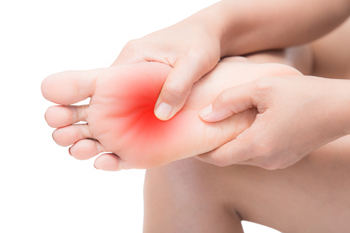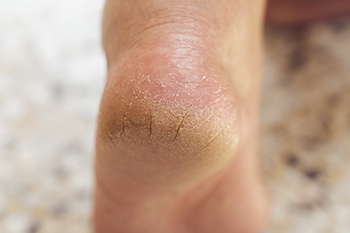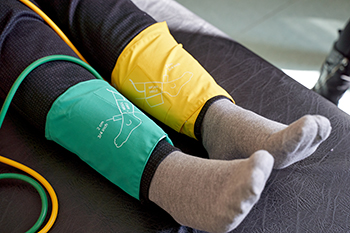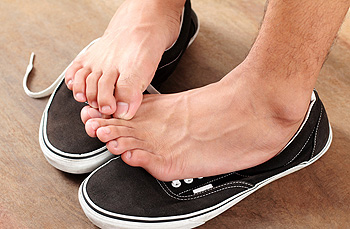Connect With Us
Blog
Items filtered by date: November 2023
About Peripheral Neuropathy

Peripheral neuropathy, a condition where nerves in the body's extremities like feet are damaged, is especially prevalent in those over 55 years old. This nerve damage can affect sensory, motor, and autonomic nerves, leading to symptoms such as numbness, tingling, pain, muscle weakness, and balance issues. Early consultation with a podiatrist is important for symptoms such as foot pain or wounds that are not healing, especially in people at high risk, including diabetic patients. Diabetes is the most common cause of peripheral neuropathy, where high blood sugar levels damage nerves. Other causes can include physical injuries, viral infections, medication side effects, and excessive alcohol use. Treatment varies based on the cause and symptoms. Untreated peripheral neuropathy can cause serious complications like foot ulcers, infections, gangrene, and even amputation. It can also cause heart and circulation issues. If you have symptoms of peripheral neuropathy, it is strongly suggested that you make an appointment with a podiatrist for an evaluation and treatment.
Neuropathy
Neuropathy can be a potentially serious condition, especially if it is left undiagnosed. If you have any concerns that you may be experiencing nerve loss in your feet, consult with Dr. Richard Silverstein from Union Foot Care. Our doctor will assess your condition and provide you with quality foot and ankle treatment for neuropathy.
What Is Neuropathy?
Neuropathy is a condition that leads to damage to the nerves in the body. Peripheral neuropathy, or neuropathy that affects your peripheral nervous system, usually occurs in the feet. Neuropathy can be triggered by a number of different causes. Such causes include diabetes, infections, cancers, disorders, and toxic substances.
Symptoms of Neuropathy Include:
- Numbness
- Sensation loss
- Prickling and tingling sensations
- Throbbing, freezing, burning pains
- Muscle weakness
Those with diabetes are at serious risk due to being unable to feel an ulcer on their feet. Diabetics usually also suffer from poor blood circulation. This can lead to the wound not healing, infections occurring, and the limb may have to be amputated.
Treatment
To treat neuropathy in the foot, podiatrists will first diagnose the cause of the neuropathy. Figuring out the underlying cause of the neuropathy will allow the podiatrist to prescribe the best treatment, whether it be caused by diabetes, toxic substance exposure, infection, etc. If the nerve has not died, then it’s possible that sensation may be able to return to the foot.
Pain medication may be issued for pain. Electrical nerve stimulation can be used to stimulate nerves. If the neuropathy is caused from pressure on the nerves, then surgery may be necessary.
If you have any questions, please feel free to contact our office located in Havre de Grace, MD . We offer the newest diagnostic and treatment technologies for all your foot care needs.
Common Reasons Why Cracked Heels Develop

Cracked heels, also known as heel fissures, are a common foot ailment that can be both unsightly and uncomfortable. Several factors contribute to their development. One primary cause is dry skin. The skin on the soles of your feet is naturally thicker, and when it lacks moisture, it becomes less flexible and more prone to cracking. Another factor is inadequate hydration. Dehydration can affect your body's ability to maintain skin elasticity, making it easier for your heels to crack. Additionally, prolonged standing, especially on hard surfaces, can also contribute to this problem, as it puts extra pressure on the heel area and may lead to cracks. Footwear choices play a significant role. Wearing open-back or poorly fitting shoes can increase friction and pressure on the heel, exacerbating the issue. Various medical conditions, such as diabetes or thyroid disorders, can also affect skin health and potentially lead to cracked heels. People may have lifestyle factors such as excessive bathing or exposure to harsh, dry climates which can contribute to developing cracked heels. If you have cracked heels, it is strongly suggested that you visit a podiatrist who can offer you effective treatment options, which may include prescribed medication.
If the skin on your feet starts to crack, you may want to see a podiatrist to find treatment. If you have any concerns, contact Dr. Richard Silverstein from Union Foot Care. Our doctor can provide the care you need to keep you pain-free and on your feet.
Cracked Heels
It is important to moisturize your cracked heels in order to prevent pain, bleeding, and infection. The reason cracked heels form is because the skin on the foot is too dry to support the immense pressure placed on them. When the foot expands, the dry skin on the foot begins to split.
Ways to Help Heal Them
- Invest in a good foot cream
- Try Using Petroleum Jelly
- Ease up on Soaps
- Drink Plenty of Water
Ways to Prevent Cracked Heels
- Moisturize After Showering
- Skip a Shower
- Keep Shower Water Lukewarm
- Don’t Scrub Your Feet
If you are unsure how to proceed in treating cracked heels, seek guidance from a podiatrist. Your doctor will help you with any questions or information you may need.
If you have any questions, please feel free to contact our office located in Havre de Grace, MD . We offer the newest diagnostic and treatment technologies for all your foot care needs.
Symptoms of Peripheral Artery Disease

Peripheral artery disease, or PAD, is a condition where fatty deposits build up in the arteries, restricting blood flow to muscles and organs. This poor circulation affects about 6.5 million Americans over 40 years of age. During physical activities such as walking or climbing stairs, muscles need more blood and oxygen. If arteries are clogged due to PAD, these muscles may hurt because they are not getting what they need, but the pain typically subsides with rest. However, PAD is more than just about muscle pain during activity. It can affect the overall quality and length of life, limiting how far or long one can walk, and it may increase the risk for heart attack and stroke. Despite its seriousness, PAD often goes unrecognized. People at risk for PAD typically include those who have leg pain, individuals over 70 years of age, and those over 50 years old who have diabetes, or a history of smoking. Recognizing and getting treatment for PAD is crucial for maintaining health and preventing more serious complications. If you have any of the aforementioned symptoms, or belong to a high-risk group, it is strongly suggested that you make an appointment with a podiatrist as soon as possible for a proper diagnosis and treatment plan.
Peripheral artery disease can pose a serious risk to your health. It can increase the risk of stroke and heart attack. If you have symptoms of peripheral artery disease, consult with Dr. Richard Silverstein from Union Foot Care. Our doctor will assess your condition and provide you with quality foot and ankle treatment.
Peripheral artery disease (PAD) is when arteries are constricted due to plaque (fatty deposits) build-up. This results in less blood flow to the legs and other extremities. The main cause of PAD is atherosclerosis, in which plaque builds up in the arteries.
Symptoms
Symptoms of PAD include:
- Claudication (leg pain from walking)
- Numbness in legs
- Decrease in growth of leg hair and toenails
- Paleness of the skin
- Erectile dysfunction
- Sores and wounds on legs and feet that won’t heal
- Coldness in one leg
It is important to note that a majority of individuals never show any symptoms of PAD.
Diagnosis
While PAD occurs in the legs and arteries, Podiatrists can diagnose PAD. Podiatrists utilize a test called an ankle-brachial index (ABI). An ABI test compares blood pressure in your arm to you ankle to see if any abnormality occurs. Ultrasound and imaging devices may also be used.
Treatment
Fortunately, lifestyle changes such as maintaining a healthy diet, exercising, managing cholesterol and blood sugar levels, and quitting smoking, can all treat PAD. Medications that prevent clots from occurring can be prescribed. Finally, in some cases, surgery may be recommended.
If you have any questions, please feel free to contact our office located in Havre de Grace, MD . We offer the newest diagnostic and treatment technologies for all your foot care needs.
Plantar Warts Can Be Treated!
When to See a Podiatrist About Itchy Feet

Itchy feet can be a bothersome issue, but they are often mild and temporary. Common symptoms associated with itchy feet include the formation of crust as a wound heals, and flaky or peeling skin due to extreme dryness, rashes, redness, warmth, and swelling. Sometimes, itchy feet can lead to pus-filled blisters or general tenderness and discomfort. In certain circumstances having itchy feet may necessitate a visit to a podiatrist, such as if you develop oozing blisters or feel a worm-like tingling sensation in your feet. Persistent itching that lasts for more than two weeks or recurrent flare-ups may signal a more serious issue. If the itching spreads to other areas of your body, it's probably a good idea to consult a podiatrist. In some cases, itchy feet can be a sign of underlying health problems. For instance, swelling in the legs, arms, and stomach, yellowish skin or eyes, or reduced urinary output could indicate kidney or liver issues. When these symptoms are present alongside itchy feet, it may be an indicator of potential systemic concerns. If you experience persistent or recurring foot itching, especially if it spreads to other areas of your body and occurs during pregnancy or menopause, it is suggested that you make an appointment with a podiatrist for a complete examination and suggestions for treatment.
Everyday foot care is very important to prevent infection and other foot ailments. If you need your feet checked, contact Dr. Richard Silverstein from Union Foot Care. Our doctor can provide the care you need to keep you pain-free and on your feet.
Everyday Foot Care
Often, people take care of their bodies, face and hair more so than they do for their feet. But the feet are a very important aspect of our bodies, and one that we should pay more attention to. Without our feet, we would not be able to perform most daily tasks.
It is best to check your feet regularly to make sure there are no new bruises or cuts that you may not have noticed before. For dry feet, moisturizer can easily be a remedy and can be applied as often as necessary to the affected areas. Wearing shoes that fit well can also help you maintain good foot health, as well as making it easier to walk and do daily activities without the stress or pain of ill-fitting shoes, high heels, or even flip flops. Wearing clean socks with closed shoes is important to ensure that sweat and bacteria do not accumulate within the shoe. Clean socks help to prevent Athlete’s foot, fungi problems, bad odors, and can absorb sweat.
If you have any questions please feel free to contact our office located in Havre de Grace, MD . We offer the newest diagnostic and treatment technologies for all your foot and ankle needs.
Blog Archives
- October 2024
- September 2024
- August 2024
- July 2024
- June 2024
- May 2024
- April 2024
- March 2024
- February 2024
- January 2024
- December 2023
- November 2023
- October 2023
- September 2023
- August 2023
- July 2023
- June 2023
- May 2023
- April 2023
- March 2023
- February 2023
- January 2023
- December 2022
- November 2022
- October 2022
- September 2022
- August 2022
- July 2022
- June 2022
- May 2022
- April 2022
- March 2022
- February 2022
- January 2022
- December 2021
- November 2021
- October 2021
- September 2021
- August 2021
- July 2021
- June 2021
- May 2021
- April 2021
- March 2021
- February 2021
- January 2021
- December 2020
- November 2020
- October 2020
- September 2020
- August 2020
- July 2020
- June 2020
- May 2020
- April 2020
- March 2020
- February 2020
- January 2020
- December 2019
- November 2019
- October 2019
- September 2019
- August 2019
- July 2019
- June 2019
- May 2019
- April 2019
- March 2019
- February 2019
- January 2019
- December 2018
- November 2018
- October 2018
- September 2018
- August 2018
- July 2018
- June 2018
- May 2018
- April 2018
- March 2018
- February 2018
- January 2018
- December 2017
- November 2017
- October 2017
- September 2017
- August 2017
- July 2017
- June 2017
- May 2017
- April 2017
- March 2017
- February 2017
- January 2017
- December 2016
- November 2016
- October 2016
- September 2016
- August 2016
- July 2016
- June 2016
- May 2016

